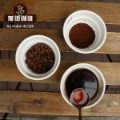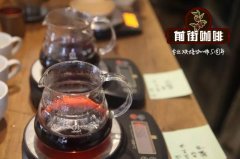What is "extraction"? Four brewing methods of extraction
What is "extraction"?
In chemistry, extraction refers to the extraction of valuable substances (flavor) from the raw material (coffee beans). In coffee extraction, the flavor is extracted from coffee powder with water.
The extracted substances have a direct effect on the flavor and aroma of coffee. Coffee contains the following water-soluble compounds, as well as many other compounds:
Caffeine (bitter)
Sour (some of which produce sour / sweet taste)
Lipids (viscosity)
Sugar (sweetness, viscosity)
Carbohydrates (viscosity, bitterness)
There are four ways of brewing:
The first is gravity. Coffee is extracted by gravity, the degree of "diffusion" in the extraction process is moderate, and the degree of "erosion" is very low, such as Chemex, Hario V60 and other hand-flushing devices. Gravity can make the coffee taste more refined and more acidic.
When using the above equipment, be sure to keep the water temperature between 93 and 96 ℃ to ensure that the diffusion rate is high enough to extract soluble substances, especially acids, from coffee. This is especially important for hand-brewed coffee because acidity can increase the complexity and purity of the taste.
The second is stress. Such as Philadelphia and mocha pots. When coffee is extracted by pressure, the degree of "erosion" in the process of extraction is very high, and the degree of "diffusion" is medium to low. Stress can make the coffee taste thicker.
As the "diffusion" rate increases, more soluble substances and fibers in coffee will be extracted. Due to the higher rate, the time of coffee extraction needs to be adjusted accordingly. In addition, the type of filter can greatly affect the final taste of coffee.
The third is soaking. Coffee is extracted by soaking, the highest degree of "diffusion" occurs in the extraction process, and the degree of "erosion" varies, so the taste of coffee is more complex and the taste is more complete.
Siphon, reverse love pressure and French pressure are the best examples of soaked coffee. It is worth noting that because French-pressed coffee has the lowest degree of "erosion" and rough grinding, its purity is usually low, and the complexity of taste can not be fully reflected.
And finally, siphon. That is, siphon coffee, its "erosion" degree is medium to low. Without extra pressure, siphon coffee tastes richer and more refined than other coffee extracted by pressure. In addition, siphon coffee also uses the soaking method, its "diffusion" degree is higher.
At the same time, another reason for the complex taste of siphon coffee is that the water temperature is higher and more soluble substances can be extracted from the coffee.
After understanding the above extraction methods and principles, we can choose the correct brewing equipment for extraction according to our taste preferences and the characteristics of coffee beans.

Important Notice :
前街咖啡 FrontStreet Coffee has moved to new addredd:
FrontStreet Coffee Address: 315,Donghua East Road,GuangZhou
Tel:020 38364473
- Prev

How to preserve coffee beans? what kind of sealed jar should be used to keep coffee beans at room temperature or in refrigerator?
Professional coffee knowledge exchange more coffee bean information please follow the coffee workshop (Wechat official account cafe_style) "buying a bean grinder is better than buying a bag of premium coffee powder." Lin Zhe-hao, a certified appraiser of the International Coffee quality Association, advises coffee lovers to buy their own roasted coffee beans and store them at home, and it is best to grind and brew their own beans, and keep them as short as possible. There are three factors affecting the preservation of coffee beans.
- Next

What is the purpose of steaming? without a hill, the beans are not fresh.
What is the purpose of steaming? without a hill, the beans are not fresh. In the first step of hand-brewing coffee, a small amount of hot water is used to moisten the surface of coffee powder evenly, and the function is to drive out the gas between coffee powder with water to form a uniform void. In the later brewing process, hot water can quickly, uniformly and fully infiltrate coffee powder to achieve the purpose of uniform extraction.
Related
- Beginners will see the "Coffee pull flower" guide!
- What is the difference between ice blog purified milk and ordinary milk coffee?
- Why is the Philippines the largest producer of crops in Liberia?
- For coffee extraction, should the fine powder be retained?
- How does extracted espresso fill pressed powder? How much strength does it take to press the powder?
- How to make jasmine cold extract coffee? Is the jasmine + latte good?
- Will this little toy really make the coffee taste better? How does Lily Drip affect coffee extraction?
- Will the action of slapping the filter cup also affect coffee extraction?
- What's the difference between powder-to-water ratio and powder-to-liquid ratio?
- What is the Ethiopian local species? What does it have to do with Heirloom native species?

